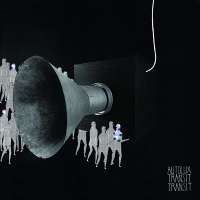Transit Transit
Transit Transit is the second studio album by American alternative rock band Autolux, released on August 3, 2010, on TBD Records (USA) and ATP Recordings (outside of North America/Japan).
| Transit Transit | ||||
|---|---|---|---|---|
 | ||||
| Studio album by | ||||
| Released | August 3, 2010 | |||
| Genre | Experimental rock, electronic | |||
| Length | 42:02 | |||
| Label | ATP Recordings, TBD Records | |||
| Producer | Autolux | |||
| Autolux chronology | ||||
| ||||
| Review scores | |
|---|---|
| Source | Rating |
| AllMusic | |
| BBC | (positive)[2] |
| The Boston Phoenix | |
| Consequence of Sound | |
| NME | |
Background
Autolux produced Transit Transit themselves with guitarist/vocalist Greg Edwards serving as engineer. Most of the record was recorded at Space 23, the band's makeshift studio in their rehearsal room near downtown Los Angeles. A few drum tracks - "Highchair", "Spots" and "The Science of Imaginary Solutions" - came from an earlier session with engineer John Goodmanson. The title track (the last song to be recorded) was recorded in Denmark by Edwards, using a virtually unplayable upright piano and a sample of a coffin-style freezer found in a nearby basement, and then finished back in Los Angeles.
"Audience No. 2" was self-released on May 21, 2008 to college radio while the band continued to write and record songs that would finally end up on Transit Transit. The single also included two B-sides: the instrumental track "Fat Kid" and a cover of the Beatles' "Helter Skelter".
Track listing
| No. | Title | Length |
|---|---|---|
| 1. | "Transit Transit" | 2:54 |
| 2. | "Census" | 4:40 |
| 3. | "High Chair" | 3:26 |
| 4. | "Supertoys" | 4:38 |
| 5. | "Spots" | 4:37 |
| 6. | "The Bouncing Wall" | 3:43 |
| 7. | "Audience No. 2" | 4:35 |
| 8. | "Kissproof" | 3:27 |
| 9. | "Headless Sky" | 4:06 |
| 10. | "The Science of Imaginary Solutions" | 6:03 |
Credits
- All songs written by Autolux
- Produced by Autolux
- Engineered by Greg Edwards at Space 23
- Mixed by Kennie Takahashi and Dave Sardy
- Mastered by Bob Ludwig
- Artwork by Kill Pixie (aka Mark Whalen)